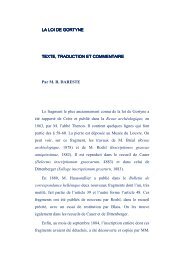CYPRIOT GRAMMAR
CYPRIOT GRAMMAR
CYPRIOT GRAMMAR
Create successful ePaper yourself
Turn your PDF publications into a flip-book with our unique Google optimized e-Paper software.
Singular<br />
ΕΝΝΙΚΟΣ________ΠΛΥΧΗΝΝΤΙΚΟΣ<br />
Greek___________English<br />
Pers.Pr.__Verb__________Pers.Pr.__Verb<br />
Εμέναν__φαίνεσται μου___Εμάς__φαίνεσται μας<br />
Εσέναν__φαίνεσται σου___Εσάς__φαίνεσται σας<br />
Τούτου__φαίνεσται του__Τούτων__φαίνεσται τους<br />
Τούτης__φαίνεσται της__Τούτων__φαίνεσται τους<br />
Τούτου__φαίνεσται του__Τούτων__φαίνεσται τους<br />
Plural<br />
Φαίνουνται, νοιάζου(ν), κάμνου(ν), αναδόχνου(ν), δόχνου(ν), λαχαίνου(ν), αρέσκου(ν), κανού(ν), κόφτου(ν), λαλού(ν).<br />
ΕΝΝΙΚΟΣ________ΠΛΥΧΗΝΝΤΙΚΟΣ<br />
Greek___________English<br />
Pers.Pr.__Verb__________Pers.Pr.__Verb<br />
Εμέναν__αρέσκου μου____Εμάς__αρέσκου μας<br />
Εσέναν__αρέσκου σου____Εσάς__αρέσκου σας<br />
Τούτου__αρέσκουν ντου__Τούτων__αρέσκουν ντους<br />
Τούτης__αρέσκουν ντης__Τούτων__αρέσκουν ντους<br />
Τούτου__αρέσκουν ντου__Τούτων__αρέσκουν ντους<br />
Note<br />
The deponent verb κανεί (to be sufficient) and λαλού(ν) (only in plural! to be called) take the ACCUSATIVE personal pronouns! In addition<br />
in its plural form κανούν (they suffice) transfers its final –ν unto the personal pronouns of the Third person singular and plural as above.<br />
ΕΝΝΙΚΟΣ________ΠΛΥΧΗΝΝΤΙΚΟΣ<br />
Greek___________English<br />
Pers.Pr.__Verb_____Pers.Pr.__Verb<br />
Εμέναν__κανεί με___Εμάς__κανεί μας<br />
Εσέναν__κανεί σε___Εσάς__κανεί σας<br />
Τούτον__κανεί τον__Τούτους_κανεί τους<br />
Τούτην__κανεί την__Τούτες_κανεί τες<br />
Τούτο___κανεί το___Τούτα__κανεί τα<br />
ΕΝΝΙΚΟΣ________ΠΛΥΧΗΝΝΤΙΚΟΣ<br />
Greek___________English<br />
Pers.Pr.__Verb________Pers.Pr.__Verb<br />
Εμέναν__κανού με_____Εμάς__κανού μας<br />
Εσέναν__κανού σε_____Εσάς__κανού σας<br />
Τούτον__κανούν ντον__Τούτους_κανούν τους<br />
Τούτην__κανούν ντην__Τούτες_κανούν τες<br />
Τούτο___κανούν ντο___Τούτα__κανούν τα<br />
17.2.3 There is/are<br />
1. Έσ’ει is another deponent verb which simply means ‘there is/are’<br />
Examples:<br />
Έσ’ει έναν άππαρον δαμαί.<br />
There is a horse here.<br />
Έσ’ει πολλα κοπελλούθκια μιτσ’ά δαμαί.<br />
There are a lot of children here.<br />
2. Eν/που/αν πλάσκεται<br />
Πλάσκεται is another form of ‘there is/are’ with an emphasis on existence or on a possibility of existence. Please do note that this deponent<br />
verb is only used with the particles of Eν (not), που (that/where) and αν (if).<br />
17.3 Verbs and cases<br />
In Cypriot all verbs take a specific case in order to make sense. The vast majority of verbs take the ACCUSATIVE however some verbs take<br />
two cases which change its meaning to some level. In this section I will present a great number of examples which take Nominative or the<br />
Genitive or both the Accusative and Genitive. Simply assume that whichever verb is not included probably takes the ACCUSATIVE.<br />
Nominative<br />
The single verb in Cypriot that takes the Nominative is Είμαι and never uses personal pronouns in the Accusative or Genitive.<br />
Genitive<br />
τραουώ (to sing), τανώ (to help), μηνώ (to give a message), κοττώ (to get rid of sth to sb), κοκκολοώ (to say bit by bit/to collect one by<br />
one), φελώ (to owe), λαλώ (to say), φταίω (to blame), αρέσκω (to be popular), πέμπω (to send), βάλλω (to place), πουλώ (to sell),<br />
56





